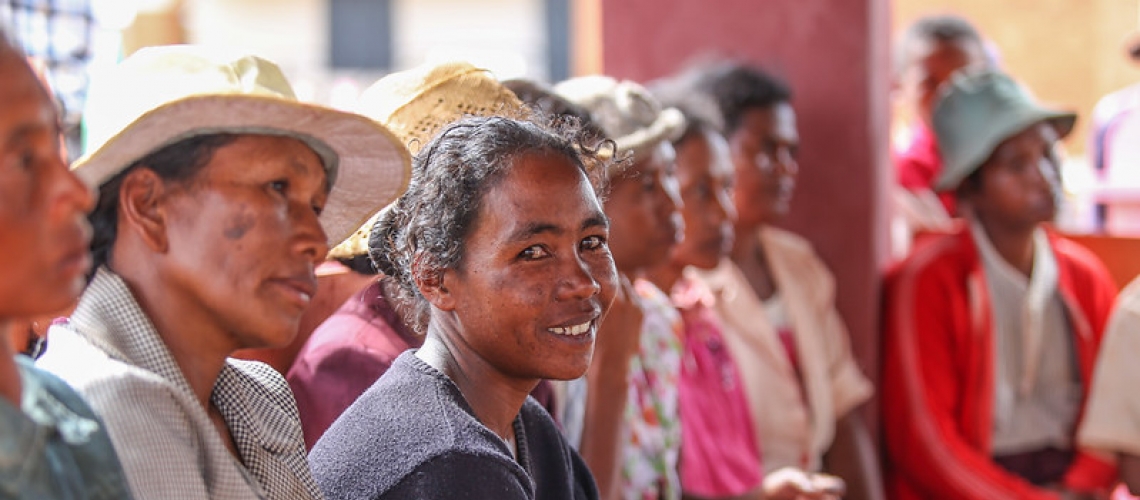Re-booting public procurement to revitalize the 'social contract' of governance
 Women beneficiaries of IDA funded Programs in Soavina, Madagascar
Women beneficiaries of IDA funded Programs in Soavina, Madagascar
Governance in any democratic society is the effective result of a social contract between the state and the citizen – sometimes explicit, but more often implied. This mutually beneficial agreement is predicated on trust, legitimacy, and consent.
Global public procurement, the process of purchasing goods, services, or works by the public sector from the private sector, runs over US $11 trillion in value, representing approximately 13% of worldwide GDP. That share which is even larger in some economies is a critical dimension of public financial management that demands global attention because of the increasing magnitude of fiscal spending. When we look ‘under the hood,’ however, to better understand the nexus between public procurement and quality of governance, a richer and more meaningful set of connections begins to emerge.
. This is done through the establishment and implementation of public purchasing in ways that maintain and reinforce credibility and responsiveness to the needs of citizens through procedural fairness and ethical and sustainable sourcing. One empirical study of the Swedish construction sector indicates, for example, that more collaborative approaches through implementing cooperative, transparent partnerships with private-sector end-users, facilitates increased trust and improved governance.
Level Playing Field
Public trust is in part a function of transparency and accountability throughout the purchasing process – from needs assessment, planning, and packaging, throughout the bidding, pre and post award process, including contract management, monitoring, and evaluation. This enables results-oriented outcomes for ultimate end-users. . Transparency International Slovakia found that transparency reforms in procurement that included contract publication led to an increase in bids from an average of 2.3 per public tender in 2009 to 3.6 in 2013.
In Georgia all information – including amended contracts – is made public. To incentivize good corporate performance and make sure mistakes are not repeated, lists of whitelisted and blacklisted companies are published. This has led to increased trust.
Value–for–money is only achieved when the correct means are applied to achieve the right ends. For example, to overcome corruption in textbook procurement, the Philippines Education Ministry set up a ‘textbook count’ program bringing in citizen observers during the pre-bidding, bidding, and post-qualification stages. Such citizen observers also inspected quality of textbooks and monitored delivery to schools. This program is reported to have resulted in the reduction in price of textbooks by over 40% and the replacement of over 60,000 defective textbooks, thus increasing public trust and satisfaction in the public-school textbook procurement process.
Ethical and Sustainable Sourcing
Public procurement, grounded in procedural fairness, becomes effective in any national (or wider) context through addressing broader issues of social equity and environmental balance that form the core of any responsive social contract in this 21st century.
Ethical and sustainable sourcing, a critical predicate to the achievement of the Sustainable Development Goals, mandates use of supply chains that adhere to increasingly accepted global standards related to use of labor, equipment, and materials. These imperatives respect human rights, promote inclusion and diversity, and minimize environmental damage.
Economically and socially disadvantaged groups can be targeted in various ways by rolling out ethical sourcing, direct and indirect, to reduce barriers to economic participation and to promote employment, improved livelihood, and inclusion. Sustainable sourcing (or ‘green procurement’) promotes environmentally friendly purchasing – or procuring goods, services, and works with reduced environmental impact and/or work methods and procedures that minimize environmental damage and degradation.
Revitalizing Public Trust
Public policies and procedures, including those relating to procurement, have recently been seen in many countries, through a populist lens, as instruments of ‘elite-capture’ and skewed in favor of vested interests. The ‘social contract’ has thus been increasingly perceived as no longer a representative and consensual exchange for the common good but effectively a coercive and corrupted mechanism, manipulated and ‘rigged’.
At the same time, confronted by the COVID-19 pandemic and related emergencies, there is a broad-based public recognition of pronounced need for diversified local and international supply chains and targeted public services that involve challenging issues of national, regional, and global procurement-related coordination, integration, and complexity.
These current realities underscore the role of procurement as a core mechanism to engender improvements in public trust. This can be done through promoting more transparent, responsive, and accountable provision of publicly demanded supplies and services. There is, thus, an urgent need to find ways to improve governance and the professionalization of procurement systems and processes.
What is missing, however, is a practical “go to” space for creating and sharing tools and solutions to make public purchasing more effective and socially responsive in ways that increase government credibility and revitalize public trust. The World Bank has made a preliminary start in this direction with initiatives such as the ongoing data collection through the Global Public Procurement Database (DPPD), providing easy access to public procurement data and enabling users to identify and manage integrity and transparency risks through the Procurement Anti-Corruption and Transparency Platform - ProACT (in development), as well as introducing country-specific public procurement centered indicator(s) as part of market regulation and other developmental assessments (through the Global Indicators Group). Much more needs to be done, however, to meaningfully inform and engage stakeholders and policymakers on the potential dynamism between strategic uses of public procurement and revitalizing public trust.
